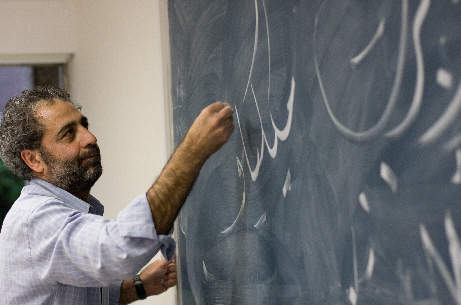
Research led by Gates alumnus Eric Jensen looks at rise of science and arts festivals.
The growth and increasing popularity of science and arts festivals around Britain is only possible with the help of an army of willing, but unpaid student volunteers, according to a report led by a Gates alumnus.
Research for the National Co-ordinating Centre for Public Engagement (NCCPE), led by Gates alumnus Dr Eric Jensen, reveals that despite the lack of remuneration, 92% of students surveyed say that they would volunteer again and 75% believe that the skills and experience they got from volunteering will benefit them in their future careers.
Dr Jensen, who is based at the University of Warwick, conducted his research with Nicola Buckley of the University of Cambridge. It explores the role of students in festival-based public engagement. A total of 155 student volunteers and festival-organisers were questioned about their experience of student volunteering across science and arts festivals.
The findings show that UK universities are active supporters of science and arts festivals for the public. Festival organisers reported that the enthusiasm and expertise of volunteering students and staff comprised the most valuable aspect of engaging with universities in delivering their festivals.
Two-thirds of festival organisers work with universities and more than half (56%) are given access to university premises free of charge. For 60% of festival-organisers the benefit of working with a university includes access to a wide range of expert speakers and artists, and for the majority (69%), the primary benefit is access to human resource in the form of unpaid student volunteers.
The majority (55%) of festivals surveyed operated with just five paid members of staff. Seventy-five percent of the jobs performed by student volunteers provided some interaction with the public such as meeting and greeting, manning stands or discussing science, art and other topics with publics.
Sophie Duncan, Deputy Director, NCCPE, said: “Festivals are an excellent introduction to public engagement for students and offer experiences and skills that will benefit them throughout their careers. The majority of volunteers in our sample are post-graduate students, some of whom will go on to be researchers. With impact now part of the REF [Research Excellence Framework] and the value of publicly-funded universities in the spotlight, it is increasingly important for academics as well as universities to embrace public engagement. Hopefully what we are witnessing is a new generation of researchers, lecturers and future Vice Chancellors that are introduced to public engagement early in their careers and remain open and enthusiastic about the mutual benefits it can bring.”
The most challenging aspect of using student volunteers in festivals is the high level of training required. A number of festival organisers have had to adjust their expectations of student volunteers’ prior practical knowledge, and now provide training at a fundamental level.
Dr Jensen commented: “It is important for both universities and funding bodies to understand that the provision of volunteering opportunities within festivals is resource-intensive. Despite how it might seem, student volunteers are not free labour. If they are to be used most effectively staff time, training and resources are required and these activities require funding and careful planning and attention.”
Further findings from the research include:
Positive experiences
– Universities and their various communication networks comprise a key hub for recruiting student workers and volunteers to the festival, be it through electronic mailing lists or student society involvement.
– When students were asked why they got involved in working at a festival, most responses could be categorized as “skills/career development” motivations.
– The majority of participants reported having done other volunteering outside of festivals whilst at university (76.7%). This suggests that volunteering at festivals correlates highly with student involvement in other volunteering opportunities at university.
– 17.1% of festival organisers recruit students for temporary paid roles.
– The most common type of role (46.5%) respondents fulfilled within their festival experience was educational, followed by ‘workshop or activity leader’ (28.3%) and ‘steward’ (26.3%).
– A recurring theme from both organisers and student volunteers is that one of the advantages of student volunteers is that they are easier and less intimidating for some festival visitors to approach. Their general enthusiasm combined with relevant knowledge about the applications and implications of a topic were seen as particularly valuable for visitors.
Problem areas:
– When asked what the most challenging aspects of a Festival’s interaction with universities, most responses revolved around difficulties negotiating the highly varied university landscape to identify individuals who would like to participate in festival-based public engagement.
– The most frequently identified failing of unpaid volunteers by organisers was their levels of dedication / independent responsibility.
Dr Jensen [2003] is Assistant Professor of Sociology at the University of Warwick, where he leads a new Msc programme in Science, Media and Public Policy. He is co-editing and contributing to the forthcoming book Culture & Social Change: Transforming Society through the Power of Ideas (Information Age). He did his PhD in Social and Political Science at Cambridge, funded by a Gates scholarship.
A full copy of the report can be found at www.publicengagement.ac.uk












